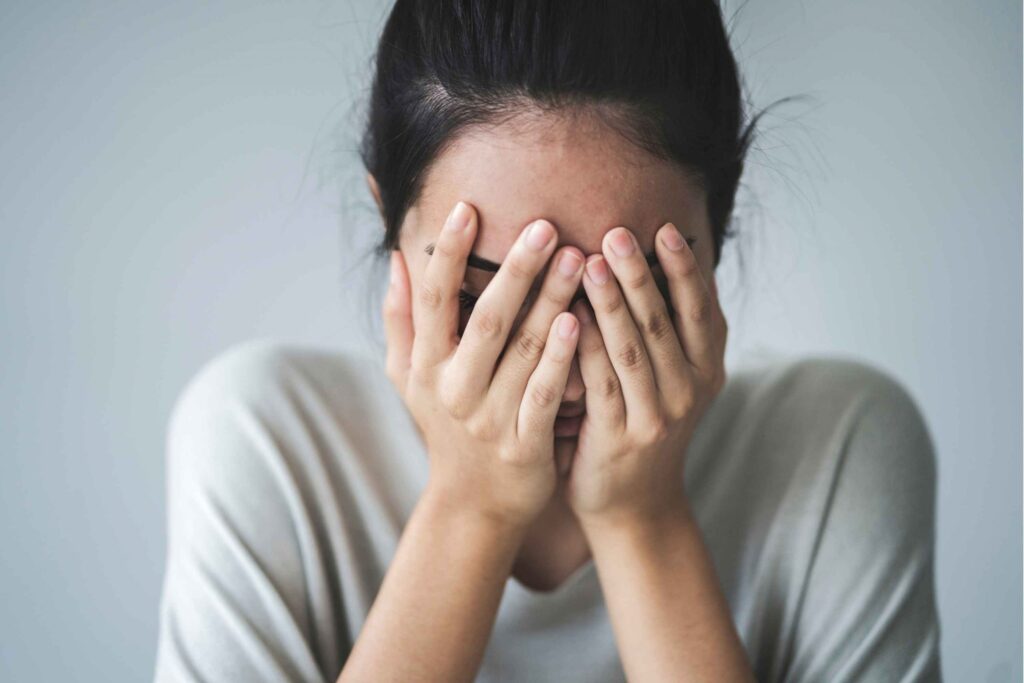Anxiety is your body’s natural response to stress. It’s a feeling of fear or apprehension about what’s to come. For example, going to a job interview or giving a speech on the first day of school may cause some people to feel fearful and nervous.
But if your feelings of anxiety are extreme, last for at least 6 months, and are interfering with your life, you may have an anxiety disorder.

What are types of Anxiety Disorders?
Anxiety disorders are a group of mental health conditions characterized by excessive and persistent worry, fear, or anxiety that can significantly impact a person’s daily life. These disorders can manifest in various forms and may range from mild to severe. Some common types of anxiety disorders include:
-
- Generalized Anxiety Disorder (GAD): Individuals with GAD experience chronic and excessive worry about a wide range of everyday events and activities. The worry is often disproportionate to the actual threat or situation.
- Panic Disorder: People with panic disorder experience sudden and intense episodes of fear or panic, known as panic attacks. These attacks can be accompanied by physical symptoms such as rapid heart rate, sweating, trembling, and a sense of impending doom.
- Social Anxiety Disorder (Social Phobia): This disorder involves an intense fear of social situations and the fear of being judged or embarrassed by others. It can lead to avoidance of social interactions and can significantly impact personal and professional relationships.
- Specific Phobias: Specific phobias involve an irrational and intense fear of a particular object or situation, such as heights, flying, spiders, or needles. The fear can lead to avoidance behavior and may interfere with daily life.
- Obsessive-Compulsive Disorder (OCD): OCD is characterized by intrusive, unwanted thoughts (obsessions) and repetitive behaviors or mental acts (compulsions) performed in an attempt to alleviate the anxiety associated with the obsessions.
- Post-Traumatic Stress Disorder (PTSD): PTSD can develop after exposure to a traumatic event, such as a natural disaster, assault, or military combat. Symptoms may include intrusive memories, nightmares, hypervigilance, and avoidance of reminders of the trauma.
- Separation Anxiety Disorder: This disorder typically begins in childhood and involves excessive anxiety related to separation from attachment figures, such as parents or caregivers.
- It’s important to note that anxiety disorders are treatable, and various therapeutic approaches, including psychotherapy, medication, or a combination of both, can be effective in managing symptoms. If you or someone you know is experiencing symptoms of an anxiety disorder, it’s advisable to seek professional help from a mental health professional.
What are Symptoms of Anxiety..?

he symptoms of anxiety can vary widely depending on the specific type of anxiety disorder and the individual. However, some common symptoms associated with anxiety disorders include both physical and psychological manifestations. It’s important to note that experiencing occasional anxiety is a normal part of life, but when these symptoms become chronic, intense, or interfere with daily functioning, it may indicate an anxiety disorder. Here are common symptoms of anxiety:
Physical Symptoms:
-
- Muscle tension: Feeling tense, tight muscles, or experiencing muscle aches.
- Fatigue: Feeling tired or lethargic even without physical exertion.
- Restlessness: A sense of being on edge or an inability to sit still.
- Increased heart rate: Feeling a rapid or pounding heartbeat.
- Sweating: Excessive sweating, especially in stressful situations.6
- Trembling or shaking: Hands, legs, or other body parts may shake involuntarily.
- Shortness of breath: Feeling like you can’t get enough air.
- Dizziness or lightheadedness: Feeling unsteady or woozy.
Psychological Symptoms:
-
- Excessive worry: Persistent and uncontrollable thoughts about future events, often anticipating negative outcomes.
- Irritability: Feeling easily annoyed or agitated.
- Trouble concentrating: Difficulty focusing or feeling easily distracted.
- Sleep disturbances: Difficulty falling asleep, staying asleep, or experiencing restless sleep.
- Racing thoughts: A fast stream of thoughts, making it challenging to slow down mentally.
- Nervousness or a sense of impending doom: Feeling like something bad is about to happen.
- Avoidance behaviors: Avoiding certain situations or places that trigger anxiety.
- Panic attacks: Sudden and intense episodes of fear or discomfort, accompanied by physical symptoms like chest pain, sweating, and shortness of breath.
Behavioral Symptoms:
-
- Avoidance: Avoiding situations or activities that trigger anxiety.
- Compulsive behaviors: Engaging in repetitive behaviors or rituals to reduce anxiety (common in OCD).
- Difficulty with daily tasks: Finding it challenging to carry out everyday activities due to anxiety.
- Procrastination: Putting off tasks due to fear or anxiety about the outcome.
- It’s essential to recognize that everyone may experience anxiety differently, and individuals with anxiety disorders may not exhibit all of these symptoms. Additionally, physical symptoms can sometimes be misattributed to medical conditions, so it’s crucial to consult with a healthcare professional for a thorough evaluation and appropriate diagnosis. If you or someone you know is experiencing symptoms of anxiety, seeking help from a mental health professional is recommended for support and guidance.
Causes of Anxiety
The causes of anxiety are multifaceted, often involving a combination of genetic, biological, environmental, and psychological factors. Genetic predisposition, imbalances in brain chemistry, and family history contribute to vulnerability. Stressful life events, trauma, or chronic medical conditions can trigger or exacerbate anxiety. Personality traits, such as a tendency toward perfectionism or negative thinking, may also play a role. Substance abuse and certain medications can contribute to anxiety symptoms. Ultimately, anxiety arises from a complex interplay of various elements, and individual experiences may vary.
Risk of Anxiety Disorders
Several factors contribute to the risk of developing anxiety disorders.
Individuals with a family history of anxiety or other mental health disorders are at an increased risk due to genetic predispositions.
Women are generally more susceptible than men, and specific life stages, such as adolescence or early adulthood, may heighten vulnerability.
Traumatic experiences, chronic stress, or major life changes can elevate the risk.
Personality traits like a tendency to worry excessively or have a negative outlook may also contribute.
Pre-existing medical conditions and substance abuse can further increase susceptibility.
Ultimately, the risk varies among individuals based on a combination of genetic, environmental, and personal factors.
What are the Treatments for Anxiety?
-
Psychotherapy:
- Cognitive-Behavioral Therapy (CBT): Focuses on changing negative thought patterns and behaviors associated with anxiety.
- Exposure Therapy: Gradual and controlled exposure to feared situations to reduce anxiety.
- Mindfulness-Based Therapies: Techniques to increase awareness of the present moment, such as mindfulness meditation.
Medications:- Antidepressants: Selective serotonin reuptake inhibitors (SSRIs) and benzodiazepines are commonly prescribed.
- Anti-anxiety Medications: Medications like buspirone may be used for generalized anxiety disorder.
- Beta-Blockers: Used to manage physical symptoms of anxiety, such as rapid heart rate.
Lifestyle Changes:- Regular Exercise: Physical activity can reduce anxiety and improve mood.
- Healthy Diet: Nutrient-rich foods can positively impact mental health.
- Adequate Sleep: Establishing good sleep hygiene is crucial for managing anxiety.
Relaxation Techniques:
- Deep Breathing Exercises: Controlled breathing can help manage anxiety symptoms.
- Progressive Muscle Relaxation (PMR): Sequential tensing and relaxing of muscle groups to reduce tension.
Support Groups:- Joining support groups or therapy groups provides a sense of community and understanding.
Stress Management:
- Learning and practicing stress management techniques can help prevent anxiety.
It’s essential for individuals experiencing anxiety to consult with a mental health professional for a thorough assessment and to determine the most appropriate treatment plan. Tailoring interventions to individual needs is crucial for successful anxiety management. In some cases, a combination of approaches may be recommended for the best results.
Natural Remedies to Avoid Anxiety
-
- Regular Exercise: Physical activity can reduce stress hormones and increase the production of endorphins, improving mood.
- Balanced Diet: Maintain a nutritious diet with a focus on whole foods, lean proteins, fruits, and vegetables to support overall well-being.
- Adequate Sleep: Prioritize good sleep hygiene by maintaining a consistent sleep schedule and creating a relaxing bedtime routine.
- Mindfulness and Meditation: Practices like mindfulness meditation or deep breathing exercises can promote relaxation and reduce anxiety.
- Herbal Supplements:
Valerian Root: Some people find it helpful for promoting relaxation and sleep.
Chamomile: Known for its calming properties and potential anxiety-relieving effects. - Limit Caffeine and Alcohol: Reduce or eliminate caffeine and alcohol intake, as they can contribute to anxiety and disrupt sleep.
- Aromatherapy: Certain scents, such as lavender or chamomile, may have calming effects. Consider using essential oils or aromatherapy.
- Stay Hydrated: Dehydration can contribute to stress and anxiety, so ensure you drink enough water.
- Yoga or Tai Chi: These mind-body practices combine physical movement with relaxation techniques, promoting overall well-being.
- Social Support: Maintain strong social connections with friends and family, as having a support system can alleviate feelings of isolation.
Anxiety is a complex mental health condition with various forms and manifestations. It can arise from a combination of genetic, biological, environmental, and psychological factors. While some level of anxiety is a normal part of life, persistent and excessive worry or fear that interferes with daily functioning may indicate an anxiety disorder.
